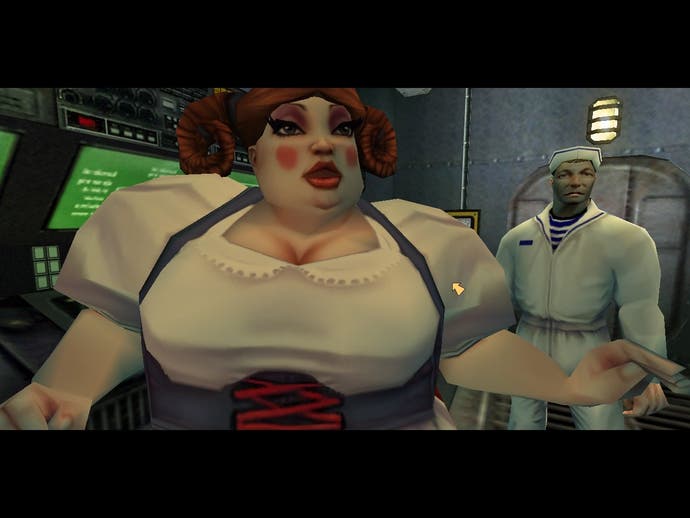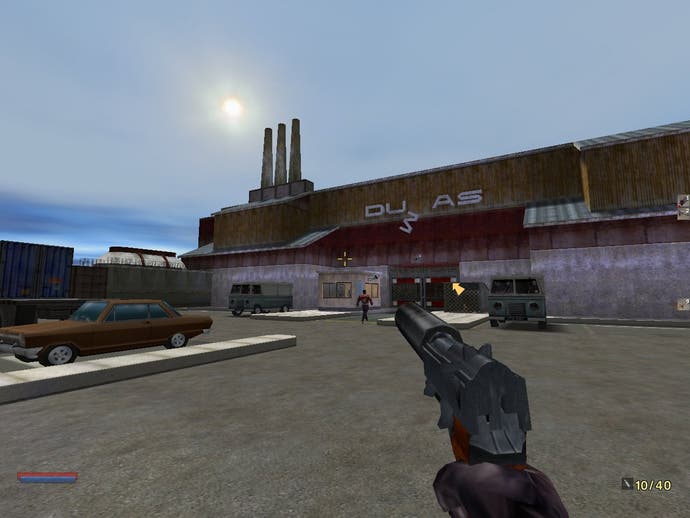Retrospective: The Operative: No One Lives Forever
I spy with my freakishly giant eye.
There are references to things being "groovy", and fantastic bad taste décor throughout, and most of all NOLF is a game that never shies away from a ludicrous national stereotype. Moroccans exclaim in horribly poor accents, "Bullets are not my favourite!" when fired upon, and the street vendors loudly arguing about the quality of their monkeys. Germans below "JAWOHL!" at each other, while being anal about details. Americans are loud, brash and stupid. Brits are posh, rude and stupid. And so on. Cate Archer is apparently Scottish, but Kit Harris' voice (replaced in the sequel by Princess Peach herself, Jen Taylor) only sounds awkward when attempting an "aye" in the middle of her plummy British tones.
The same sorts of deliberately crass attitudes are applied to women, Archer the constant recipient of abuse from her colleagues. At one point a fellow agent forgives her for an outburst, beginning his explanation, "Because you're a woman and therefore genetically unable to bridle your emotions..." But here the consistently brilliant script really shines, with smart discussions of feminism creeping in. And it's not the only subject to get a clever turn.
One of NOLF's greatest features is the overheard conversations. If you don't run in and kill everyone in a room, but rather hang out behind a corner, you hear so much fantastic stuff. Often these are brilliantly inane discussions about absolute nonsense, but occasionally things get deep. At one point a henchman explains to another the sociological nature of criminality, using his own path to his current career as an explanation, his ontological musing eventually analysing the conversation itself. Until you walk around the corner and shoot them both in the head. (Anyone who's played and remembered it will, however, be thinking of that goat conversation, but that's a surprise that should never be spoiled.)

Another source of gags are the pieces of 'intelligence' scattered all over levels. Briefcases, envelopes, blueprints, films and so on each contain a one- or two-line gag to read. So rather than hunting them all down for the (sense of) achievement (in 2000 we'd yet to enter this ridiculous phase), you do it because you don't want to miss out on a joke. Then there's the game's obsession with sheep and goats (get poisoned and you'll see rotating green and blue goats all around you, to offer one of the slightly more savoury examples).
Amongst this, and I'd argue vital to the humour's effectiveness, are moments of pathos that are also successfully performed. Archer's relationship with the older spy, Bruno, is especially evocative. And even more so, the main plot is surprisingly downbeat, with a lot of death and failure. Your failure is emphasised to you throughout, in a quite unrelenting fashion.
Perhaps the greatest weakness of NOLF is that the extremely long cut-scenes between levels weren't woven into the game more cleverly. A conversation in the War Room between three characters can last over five minutes, with nothing other than their heads to look at. These could have been something you moved about during, or listened to as you played the start of a mission.

Perhaps what I like most about NOLF, above and beyond its humour, smart level design and constant variety, is its generosity. Too many games attempt to starve you, forcing you to survive on scraps. NOLF throws ammo around like confetti, offers an abundance of weapons, and makes sure you never go too far without more armour. This is because it knew to do something that so few games ever understand: it's interesting rather than difficult. It's not about whether you can reach the end of the level, but how you choose to get there.
The thought of a non-Valve FPS this big, this well written, and this inventive, built today with today's engines, makes me sigh deep inside. Not even Monolith comes close any more, with its misery-guts Condemned and FEAR franchises. I cannot imagine how much it would cost, and certainly can't imagine the publisher who'd be willing to risk it. But I wish someone else would.
